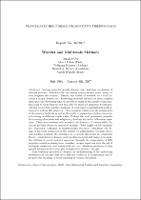Zusammenfassung
Various scientific models demand finer and finer resolutions of relevant features. Paradoxically, increasing computational power serves to even heighten this demand. Namely, the wealth of available data itself becomes a major obstruction. Extracting essential information from complex structures and developing rigorous models to quantify the quality of information leads to tasks that are not tractable by standard numerical techniques. The last decade has seen the emergence of several new computational methodologies to address this situation. Their common features are the nonlinearity of the solution methods as well as the ability of separating solution characteristics living on different length scales. Perhaps the most prominent examples lie in multigrid methods and adaptive grid solvers for partial differential equations. These have substantially advanced the frontiers of computability for certain problem classes in numerical analysis. Other highly visible examples are: regression techniques in nonparametric statistical estimation, the design of universal estimators in the context of mathematical learning theory and machine learning; the investigation of greedy algorithms in complexity theory, compression techniques and encoding in signal and image processing; the solution of global operator equations through the compression of fully populated matrices arising from boundary integral equations with the aid of multipole expansions and hierarchical matrices; attacking problems in high spatial dimensions by sparse grid or hyperbolic wavelet concepts. This workshop proposed to deepen the understanding of the underlying mathematical concepts that drive this new evolution of computation and to promote the exchange of ideas emerging in various disciplines.

